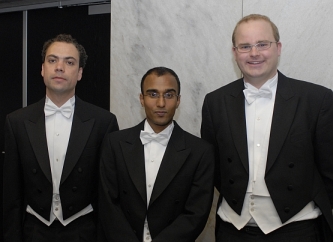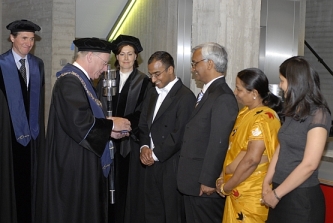Transition During IT Outsourcing
For IT managers, immediately after signing the contract to outsource certain IT activities, the critical stage of Transition arises that determines how exactly to transfer outsourced activities from the client to the vendor firm. Vinay Tiwari’s dissertation <link erim events _blank>Transition Process and Performance in IT Outsourcing: Evidence from a Field Study and Laboratory Experiments, provides insights on Transition for both academic scholars and practitioners.
 In the dissertation, Tiwari first illustrates how a real-life transition process proceeds through three distinct phases – transfer, adapt and routinize. It provides a transition process model, along with the triggers, key activities, and outcomes of each phase. It also underlines the challenges and solutions, as a reference for IT managers in client and vendor firms concerned with executing transitions in an IT outsourcing relationship. Second, by utilizing laboratory experiments to capture Transition and IT outsourcing, he shows that the choice of a particular transfer mechanism, whether it is directions-based (such as a manual or training) or routine-based (such as an observation), influences transition performance. Third, building on these experiments, Tiwari further demonstrates that the choice of transfer mechanism for better transition performance is guided by the level of task complexity and the utilization of codification practices, namely using templates and interactive document reviews. It shows, rather counter-intuitively, that while observation might always seem to be the best transfer mechanism, this is not the case, specifically, for low complexity tasks, where performance from using a manual (a relatively low-cost mechanism) is similar to that of using observation (a relatively high-cost mechanism). In addition, he also shows that the investment in adopting comprehensive codification practices (such as, following CMM or ITIL framework) can substantially payoff by better capturing and transferring knowledge, experiences, and routines related to outsourced activities, thus leading to a faster transition.
In the dissertation, Tiwari first illustrates how a real-life transition process proceeds through three distinct phases – transfer, adapt and routinize. It provides a transition process model, along with the triggers, key activities, and outcomes of each phase. It also underlines the challenges and solutions, as a reference for IT managers in client and vendor firms concerned with executing transitions in an IT outsourcing relationship. Second, by utilizing laboratory experiments to capture Transition and IT outsourcing, he shows that the choice of a particular transfer mechanism, whether it is directions-based (such as a manual or training) or routine-based (such as an observation), influences transition performance. Third, building on these experiments, Tiwari further demonstrates that the choice of transfer mechanism for better transition performance is guided by the level of task complexity and the utilization of codification practices, namely using templates and interactive document reviews. It shows, rather counter-intuitively, that while observation might always seem to be the best transfer mechanism, this is not the case, specifically, for low complexity tasks, where performance from using a manual (a relatively low-cost mechanism) is similar to that of using observation (a relatively high-cost mechanism). In addition, he also shows that the investment in adopting comprehensive codification practices (such as, following CMM or ITIL framework) can substantially payoff by better capturing and transferring knowledge, experiences, and routines related to outsourced activities, thus leading to a faster transition.
Vinay Tiwari has defended his dissertation on June 24, 2010 at 13.30 hours at Rotterdam School of Management, Erasmus University. His promoters are <link people eric-van-heck _blank>Prof.dr.ir. H.W.G.M. van Heck, Professor of Information Management and Markets, and <link people peter-vervest _blank>Prof.dr. P.H.M. Vervest, Professor of Business Telecommunications, both from Rotterdam School of Management, Erasmus University. Copromotor is Dr.ir. O.R. Koppius. Other members of the Doctoral Committee are Prof.dr. P.P.M.A.R. Heugens, Prof.dr. K.B.C. Saxena, and Prof.dr. A. Tiwana.
About Vinay Tiwari
Vinay Tiwari was born on October 30, 1980 in Virar, India. He studied his undergraduate degree in Civil Engineering at Indian Institute of Technology, Kanpur from 1998-2002. From 2002-2004, he worked as a Systems Analyst at India’s largest IT firm Tata Consultancy Services. In November 2004, he was selected for a two year MPhil in Business Research program at Rotterdam School of Management, Erasmus University. In the MPhil program, he was awarded with a scholarship. He graduated “cum laude” from the MPhil program with specialization in Information Systems.
 In December 2006, Vinay started his PhD at the Department of Decision and Information Sciences at Rotterdam School of Management, Erasmus University. His research interests include IS outsourcing and offshoring, distributed work and transition. His work has been published in MIS Quarterly and he has presented his research at various international conferences including Academy of Management and International Conference on Information Systems (ICIS). In 2009, he was invited to the ICIS doctoral consortium. Next to his academic endeavours, Vinay has also served as a PhD representative on the Faculty Council for 2008-2009.
In December 2006, Vinay started his PhD at the Department of Decision and Information Sciences at Rotterdam School of Management, Erasmus University. His research interests include IS outsourcing and offshoring, distributed work and transition. His work has been published in MIS Quarterly and he has presented his research at various international conferences including Academy of Management and International Conference on Information Systems (ICIS). In 2009, he was invited to the ICIS doctoral consortium. Next to his academic endeavours, Vinay has also served as a PhD representative on the Faculty Council for 2008-2009.
Since January 2010, Vinay works as a Process Manager in Global Functions IT at Shell. Currently (May-June 2010), his assignment involves managing a transition from the internal IT organization to a vendor firm.
Abstract
In this dissertation, complementing the strategic and economic studies on interorganizational relationships and IT outsourcing, we focus on the operational execution challenges inherent in these relationships by examining the transition stage, which starts immediately after contract signing and involves the critical transfer of knowledge, experience and routines related to outsourced activities from client to vendor firm. We focus on the transition stage due to its significance for outsourcing success, its complexity and theoretical richness, and its limited current understanding. Utilizing both a longitudinal field study and laboratory experiments to investigate transition, this dissertation generates important theoretical contributions and practical implications. In the first study (see Chapter 4), adopting a longitudinal perspective, we capture a real-life transition as it unfolds over time between a Utility company (Saturn) and a Global IT vendor (Apollo). Adopting the qualitative data analysis techniques and process theorizing guidelines, we inductively develop, explain and illustrate the transition process model consisting of three phases – transfer, adapt and routinize. For each phase, we illustrate the triggering conditions, key activities and outcomes for progression to the next phase. In the second study (see Chapter 5), building on the findings from the longitudinal qualitative field-study (Chapter 4), we focus on the transfer phase, which represents the most fundamental phase and largely determines the success of not only transition but also overall IT outsourcing relationship. To determine the influence of this phase on transition performance, we develop a novel experiment that captures outsourcing and transition scenarios in the laboratory. Using this experimental setting, we focus on understanding the relationship between transfer mechanisms (i.e. methods used to transfer knowledge, experiences and routines) and transition performance. In this study, we select the three basic and most frequently used transfer mechanisms – observation, training and manual. We find that among the three mechanisms, observation leads to the best performance. In the third study (see Chapter 6), building on the findings from the experiments (in Chapter 5), we focus on strengthening the generalizability of these findings and determining any possible moderating influences. The insights from Chapter 5 reveal that two important variables with potential moderating influence on the relationship between transfer mechanisms and transition performance are: codification and task complexity. We find that both codification and task complexity do have a moderating influence, thereby, further improving our understanding of transition performance.
More Information
Pictures of the Event
Full Text of the Dissertation


